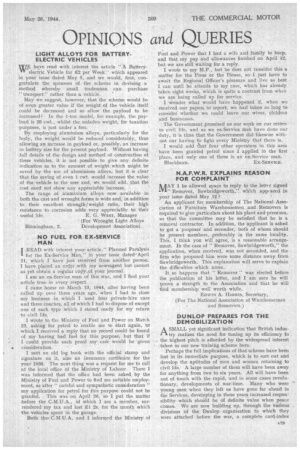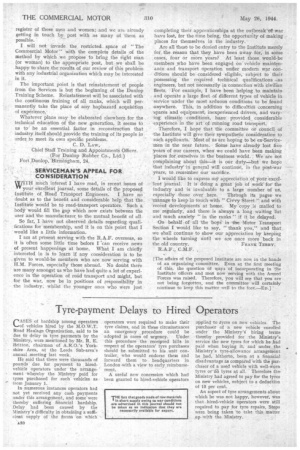OPINIONS and Q UERIES LIGHT ALLOYS FOR BATTERY. ELECTRIC VEHICLES ME
Page 31

Page 32

If you've noticed an error in this article please click here to report it so we can fix it.
have read with interest the article "A Battery" electric Vehicle for £2 per Week" which appeared in your issue dated May 5, and we would, first, congratulate the sponsors of the scheme in devising a method whereby small tradesmen can purchase "
transport" rather than a vehicle.
May we suggest, however, that the scheme would be of even greater value if the weight of the vehicle itself could be decreased and so allow the payload to be increased? In the 1-ton model, for example, the payload is 20 cwt., whilst the unladen weight, for taxation purposes, is just under a ton.
By employing aluminium alloys, particularly for the body, the weight would be reduced considerably, thus • allowing an increase in payload or, possibly, an increase in battery size for the present payload. Without having • full details of the design and method of construction of these vehicles, it is not possible to give any definite indication as to the amount of weight which might be saved by the use of aluminium alloys, but it is clear that the saving of even 1 cwt. would increase the value of the vehicle to the user and, we would add, that the cost need not show any appreciable increase.
The range of aluminium alloys now available in both the cast and wrought forms is wide and, in addition to their excellent strength/ weight ratio, their high resistance to corrosion adds very appreciably to their
useful life. E. G. WEST, Manager
(For Wrought Light Alloys Development Association).
NO FUEL FOR-EX-SERVICE MAN I READ with interest your article." Planned Paralysis
for the Ex-Service Man," in your issue dated-April 21, which I have just received from another person. I have placed an order ,with my newsagent but cannot as yet obtain a regular coPy.of your journal. I am an ex-Service man of this war, and I find your article true in every respect I came home on March 13, 1944, after having been called up over three years ago, when I had to close my business in which I Used four private-hire cars and three coaches, all of which I had to dispose of except one of each type which I stored ready for my return to civil life.
I wrote to the Ministry. of Fuel and Power on March 23, asking for petrol to enable me to start again, to which I received a reply that no record could be found Of my having had fuel for this purpose; but that if I could provide such proof my case would be given
• consideration.
I sent an old log book with the official stamp and signature on it, alto an insurance certificate for the year 1938. The next thing was a request for me to call at the local office of the Ministry of Labour. There I was informed that the office had been asked by the Ministry of Fuel and Power to find me suitable employment, as after " cafeful and sympathetic consideration " my application for petrol for this purpose could not be granted. This was on April 26, so I put the matter before the C.M.U.A., of which I am a member, surrendered my tax and lost £1 2s. for the month which the vehicles spent in the garage.
Both the: C.M.U.A. and I informed the Ministry of Fuel and Power that I had a wife and family to keep, and that my pay and allowances finished on April 12, 'but we are still Waiting for a reply.
I wrote to my M.P., but he does not consider this a matter for the Press or the House, so I just have to await the Regional Officer's pleasure and live as best I can until he attends to my case, which has already. taken eight weeks, which is quite a contrast from when we are being called up for service.
I 'wonder what would have "happened if, when we received our papers to report; we had taken as long to consider whether we could leave our wives, children and businesses.
The 'Government promised us our work on our retevi to civil life,. and as we ex-Service men have done our duty, it is time that the Government did likewise without our having to fight every Ministry that there is. I would add that four other operators in this area have been granted petrol since I applied in the first place, and only one of these is an ex-Service man.
Blackburn. EX-SERVICE.
N.A.F.W.R. EXPLAINS' REASON FOR COMPLAINT ulAY I be allowed space to reply to the letter signed Remover, Sawbridgeworth," which appr ared in your isstie dated May 12?
An applicant for membership of The National Association of Furniture Warehousemen and Removers is required to give particulars about his plant and premises,. so that the committee may be satisfied that he is a removal contractor. In addition, the applicant is asked to get a 'proposer and seconder, both of whom should be present members, preferably in the. same. locality. This, I think you will agree, is a reasonable arrangement. In the case of "Remover, Sawbridgeworth," the application, when received, was not seconded, and the firm who proposed him were some distance away from Sawbridgeworth. This explanation will serve to explain the difficulties which arose.
It_so happens that " Remover" was elected before the publication a his letter, and I am sure he will prove a strength tO the Association and that he will find membership well worth while.
EDWIN A. HARRIS, Secretary,
(For The National Association of Warehousemen and Removers.)' DUNLOP PREPARES FOR THE DEMOBILIZATION ASMALL yet significant indication that British industry realizes the need for tuning up its efficiency to the highest pitch is afforded by the widespread interest taken in our new training scheme here.
Perhaps the full implications of that scheme have been lost in its immediate purpose, which is to sort out and develop the aptitudes of men and women returning to civil life.. A large number of them will have been away for anything from two to six years. All will have been out of touch with the rapid, and in some cases revolutionary, developments of war-time. Many who were young men when they left us have gone far ahead in the Services, developing in these years increased respon: sibility which should be of definite value when peace comes. We are now building up, through the various divisions of the Dunlop organization to which they were attached before the war, a complete card-index register of these men and women; and we are already getting in touch by post with as many of them as . possible.
I will not invade the restricted space of "The Commercial Motor " with the complete details of the method by which we propose to bring the right man (or woman) to the appropriate post, but we shall be happy to share the results of our review of this problem with any industrial organization which may be interested in it.
The important point is that reinstatement of people from the Services is but the beginning of the Dunlop Training Scheme. Reinstatement will be associated with the continuous training of all ranks, which will permanently take the place of any haphazard acquisition of experience.
Whatever plans may be elaborated elsewhere for the technical education of the new generation, it seems to us to be an essential factor in reconstruction that industry itself.should provide the training of its people in. order to meet its own specific problems.
C. D. LAW,
Chief Staff Training and Appointments Officer. (For Dunlop Rubber Co., Ltd.) • Fort Dunlop, iiiimingham, 24, .
SERVICEMAN'S APPEAL FOR CONSIDERATION •
WITH much interest I have read, in recent issues of VV your ekcellent jonrnal, some details of the proposed (nstitaite of Road Transport Engineers. I have no doubt as to the benefit and considerable help that the,, Institute Would be to road transport operators. Such a bodir would fill the gap which now exists between the user and 'the manufacturer to the mutual benefit of all. So far, I have not observed details regarding qualifications for membership, and it is on this point that I
• would like a little information.
I am at present serving with the R.A.F. overseas, so it is often some little time before I 'can receive news of present happenings at home. What I am chiefly interested in is to learn if any consideration is to be . given to would-be members who are now serving with H.M. Forces, especially those abroad. No doubt there are many amongst us who have had quite a lot of experience in the operation of road transport and might, but for the war, now be in positions of responsibility in • the industry; whilst the younger ones who were just completing their apprenticeships at the outbreak Of war have lost, for the time being, the opportunity of making places for themselves in the industry.
Are all these to be denied entry to the Institute merely for the reason that they have been away for, in some cases, four or more years? At least those would-be members who have been engaged on' vehicle maintenance and transport operation under modern war conditions should be considered eligible, subject to their possessing the required technical qualifications ...as engineers, but not necessarily in connection with civilian fleets. For example, I have been helping to maintain and operate a large fleet of different types of vehicle in service under the most arduous conditions to be found anywhere. This, in addition to difficulties concerning spares and equipment, inexperienced drivers, and varying climatic conditions, have provided considerable experience in the art of running road transport.
Therefore, I hope that the committee or council of the Institute will give their sympathetic consideration to such applicants. Most of us are hoping to be ex-Servicemen in the near future. Some have already lost five years of our careers, when we could have been making places for ourselves in the business world.. We are not complaining about this—it is our duty—but we hope that industry in general will continue, in the post-war years, to remember our sacrifice.
I would like to express my appreciation-of your.excellent journal. It is doing a great job Of work' for the industry and is invaluable to a large number of us, especially those over here. Through its pages we 'manage fo keep in touch,with " Civvy Street.' and with recent developments at home. My "copy ,ig mailed to me regularly, and there is always a long waiting list and much anxiety " in the ranks" if it be delayed.
On behalf of all the boyg in the Motor Transport Section I would like to say, "thank you," and that we shall continue to show our appreciation by keeping the wheels turning until we are once more back in
the old country. FRANK TERRY. R.A.F., C.M.F.
[The affairs of the proposed Institute are now in the hands of an organizing comniittee. Even at the first meeting of this, the question of ways of incorporating in the Institute officers and men now serving with the Armed Forces was raised. Therefore, you will see that you are not being forgetten, and the committee will certainly continue to keep this matter well to the fore.--En.)




















































